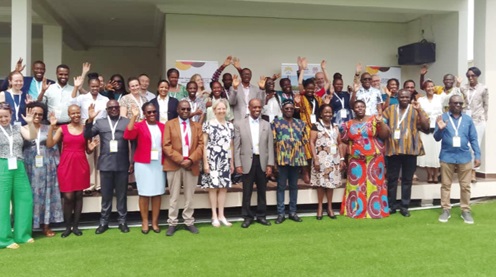A consortium of the Global Health Research Group on Homelessness and Mental Health in Africa (HOPE) has converged on Gomoa Fetteh in the Central Region to review and discuss the progress towards developing initiatives that meet the priority needs of homeless people with severe mental health conditions.
Known as the “HOPE Research Project,” the initiative aims at co-producing and testing the effectiveness of feasible interventions that address the valued needs of people who are homeless and have severe mental illness in Ethiopia, Ghana and Kenya.
The research project would also help develop effective rights-based interventions for people who are homeless and have severe mental illness.
Collaboration
The three-country level intervention is a 48-month project being funded by the National Institute for Health and Care Research (NIHR), UKAid and hosted by Basic Needs-Ghana.
It is being implemented in various sites of three countries and would culminate into a guidance manual led by the World Health Organisation (WHO) for global application.
Among the participants are the Principal Investigator, Professor Charlotte Hanlon, Prof. Ataley Alem, all of the HOPE Research Project, as well as the Ghana Lead and Co-investigator of HOPE, Peter Badimak Yaro from Ghana.
At the opening of the conference,the Minister of Health, Kwabena Mintah Akandoh, in a speech read on his behalf, said Ghana had recognised the importance of mental health to the general wellbeing of individuals and the general population.
In that regard, he said the complex situation of homelessness and homeless people who lived with mental health conditions deserved attention for a lasting solution.
“It is for this reason that the Ministry of Health finds it appropriate to be in this meeting to understand at first hand findings so far, if any, which could inform policy direction in Ghana,” he indicated and said such findings would complement efforts of the government to comprehensively address the challenges in the sector.
Mr Akandoh said the Mental Health Act 486 provided a legal foundation for mental healthcare, where the national mental health policy and its 12-year strategic plan articulated a vision for community-based integrated care.
The plan, he said, gave priority to shifting mental health services away from centralised institutions and those accessible primary healthcare levels to reduce stigma and improve access.
The minister added that the MoH was focused on strengthening the mental health workforce through training, capacity building, recruitment and on improving infrastructure to support the delivery of quality care.
Homelessness
In a speech read for him, the Country Representative of the World Health Organisation (WHO), Dr Frank Lule, identified homelessness as one complication of mental illness, which he said was directly from the impact of the condition or lack of adequate or appropriate social support services available to those at risk.
He said contrary to the notion of the bi-directional relationship between mental ill health and homelessness, only about a quarter to about a third per cent of homeless individuals have severe mental illness.
Dr Lule said the society, therefore, should ensure a decent living protected from the elements of the weather, among other needs, in fulfilment of the basic human rights of such victims.
To that end, he said the development of a cost-effective community-based intervention to address the needs of homeless people with severe mental illness, as the HOPE Research Project seeks to achieve, was timely and laudable.
Mr Yaro commended stakeholders in the health sector for their recent efforts that helped in effectively dealing with the outbreak of cholera and Cerebro-Spinal Meningitis (CSM) in parts of the country.
He said, “In many ways, homelessness is linked to mental instability and so we are too familiar with homelessness in our communities and countries.”
Mr Yaro was happy about the timing of the research, especially when changing social structures and dynamics strain long-held support systems.

